Mobile Dental Coach | Matthews Specialty Vehicles
Ultramodern mobile health care vehicles shorten the distance between patients and providers. But they’re not just for hospitals or nonprofits, especially in today’s era of vast care deserts and ongoing team shortages.
By Edward Kobesky | Photography by Matthews specialty vehicles
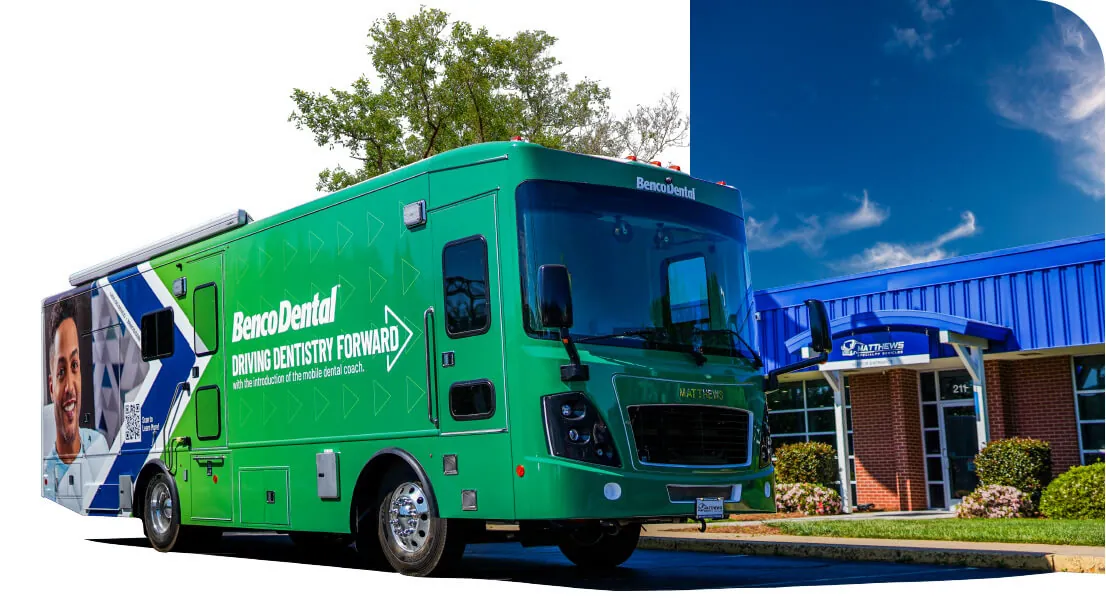
Here’s an idea for today’s competitive business environment: a dental office on wheels as the perfect alternative to brick and mortar for expanding into untapped regions. If that sounds too niche, look closer. Walmart went all in on rural health care for a reason, opening 51 Walmart Health Centers by 2024 with plans for dozens more. But wait, you say, didn’t those go under? “It’s not that Walmart couldn’t do it. It’s that they’ve chosen not to,” Hal Andrews, CEO of Trilliant Health, told Chief Healthcare Executive. “The idea that Walmart can’t operate primary care profitably is sort of a crazy idea.” In other words, it simply wasn’t profitable enough for a mega-colossus like the Bentonville behemoth. Bad news for them is good news for entrepreneurial, community-minded practices for which multibillion-dollar scaling is irrelevant.
The truth about rural populations
For many patients, distance is a far higher barrier to care than the ability to pay. The Health Resources & Services Administration has identified a staggering 7,359 provider shortage areas across the United States, in which some 85 million people live. That’s miles of opportunity for offering “concierge” dentistry to fee-for-service and insurance patients who can’t—or won’t—travel. Meanwhile, data from the Washington, D.C.–based Medicaid/Medicare/CHIP Services Dental Association indicate that about 80 percent of state Medicaid programs provide reimbursement for mobile dental care. Taken together, what does this mean? Practice owners can position mobile clinics to serve financially stable patients while also giving back to disadvantaged populations by identifying a combination of reimbursements and funding streams.
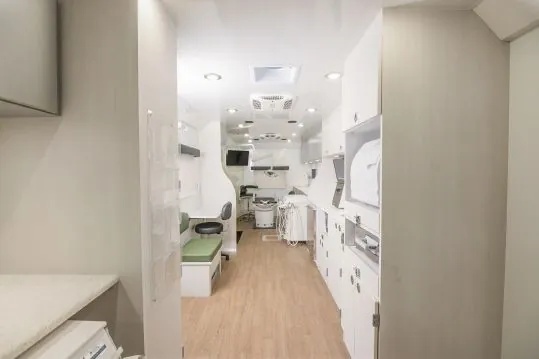
Fully wheelchair-accessible, the first Benco Dental Mobile Dental Coach is equipped with two complete operatories, full stericenter, reception area and network hookups.
Worth the investment?
The cost of a mobile dental clinic ranges from around $150,000 to over $1 million. On one hand, it might be costlier than real estate. On the other, it gives owners full flexibility to go wherever patients are while simultaneously managing financial risk. Contrast that with building out a brick-and-mortar office, which might need to be relocated or closed should it underperform. Another advantage is that a single mobile vehicle can replace multiple part-time offices, making several regular stops at central locations using the same team. Build in a telehealth component for added patient access and additional revenue, and suddenly, expanding into rural areas becomes a viable alternative to competing in some saturated urban and suburban locales.
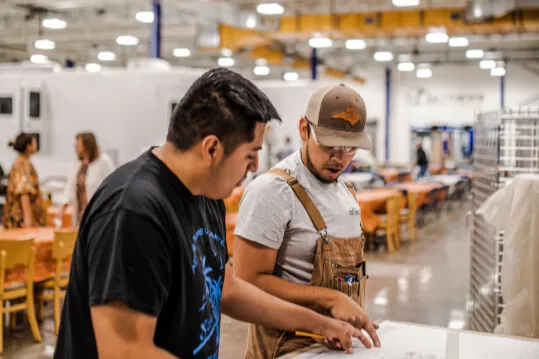
Using advanced CAD, Matthews Specialty Vehicles simulates real-world conditions, streamlining the design process and making data-driven decisions that enhance build quality and performance.
Choosing a vehicle
A mobile clinic is only as good as its ability to easily, reliably, safely and comfortably transport clinicians to patients. That’s why Benco Dental, the publisher of Incisal Edge, partnered with Matthews Specialty Vehicles to create the Benco Dental Mobile Dental Coach shown here. It’s the product of the companies’ 75-plus years of combined experience in specialty manufacturing and interior design. “The engineering and build process of specialty vehicles necessitates a congruent integration of advanced technology, reliable systems and stringent regulatory compliance,” says Michelle Shupe, director of sales and marketing for Matthews Specialty Vehicles. Simply put, it’s more complicated than buying a van and dropping it off for chairs and units to be installed.
Designing for clinical success
Rick Bolcavage, head designer of the Benco Dental Mobile Dental Coach, says settling on the vehicle’s size meant striking an ideal balance between usable interior volume and easy drivability—without any need for a commercial driver’s license. “What you see is just one of a dozen or more possible layouts,” he explains. The vehicle shown is equipped with two operatories, a full stericenter and a reception area, but some owners can free up space by doing sterilization back at the office. It also uses self-contained carts to eliminate the need for a vacuum and air compressor. Any layout within reason is possible, but Bolcavage says an experienced designer with a firm understanding of ergonomic best practices is the best person to adapt them to the constraints of mobile.
Interior finishes and exterior curb appeal
With a few notable exceptions, creating a custom interior that’s appealing for patients and team alike is generally similar to building a brick-and-mortar office. Benco Dental interior designer Emily Pieshefski says the flooring and walls require special attention but everything else can use standard finishes: “We work with only one flooring vendor [for mobile vehicles] because Matthews’s testing has proven its durability. It’s not going to peel up or shift.” She adds that the walls are limited to whites and grays because of the material necessary to absorb the rigors of the road. However, moving to the outside, purchasers have full freedom to wrap the vehicle in any graphics they choose, which has the added benefit of making the coach an effective rolling billboard.
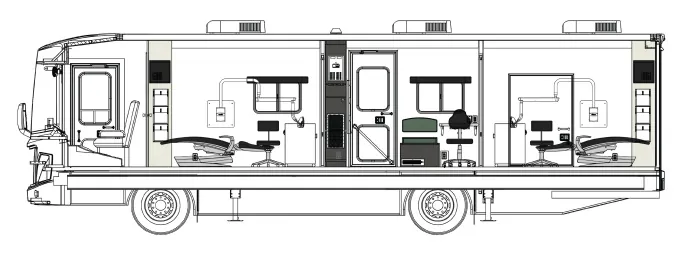
Going the distance
How long do mobile dental vehicles last, and what will they cost to run? The former is easier to answer. “Many of our customers experience 12 to 20 or more years of service from their mobile units,” says Matthews’s Michelle Shupe. The latter, of course, depends on usage, care and maintenance. Ordinary chores like engine oil and filter changes can easily be performed by local service providers.
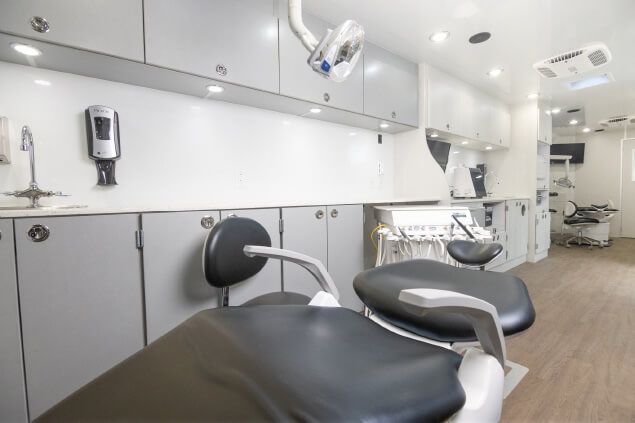
The Execution Team
Interior Design: Emily Pieshefski
Dental Design: Rick Bolcavage
Wrap Design: Allison Simenkiewicz
VP of Business Development: Julie Radzyminski
Director of Business Development: Mike Baldiga
Senior Equipment Partner: Sam Slay
Is the future of mobility for-profit?
Historically, mobile clinics have made the most sense for nonprofits and institutions, but that may be changing. Now that dental vehicles have evolved to become competitive with brick-and-mortar offices, they’re more attractive than ever for a wider range of applications. A large practice might even consider one as its primary give-back to the community; it could operate as a break-even as opposed to the practice’s owners tapping the profit pool for donations.
“The private sector is saying, ‘We’ve got to get into this.’ And it’s not to increase profit margins to some stratospheric level. It’s because it makes business sense in another way,” Stewart Hudson, executive director of the Leon Lowenstein Foundation, told Harvard’s Mobile Health Map. “It helps the goodwill of business interests that provide mobile delivery to address the needs of their customers but also as a way to attract and retain talented staff and associates.”




